Embarking on a musical journey through piano lessons can be an incredibly rewarding experience, but determining the optimal age to begin this adventure can be a perplexing decision. This guide delves into the intricate factors that influence the ideal age for piano lessons, empowering you with the knowledge to make an informed choice that aligns with your child’s unique needs and aspirations.
The age at which a child begins piano lessons can have a significant impact on their progress, enjoyment, and overall musical development. By understanding the developmental milestones, musical aptitude, and individual differences that come into play, parents and educators can create the most favorable conditions for a successful and fulfilling piano learning experience.
Developmental Factors
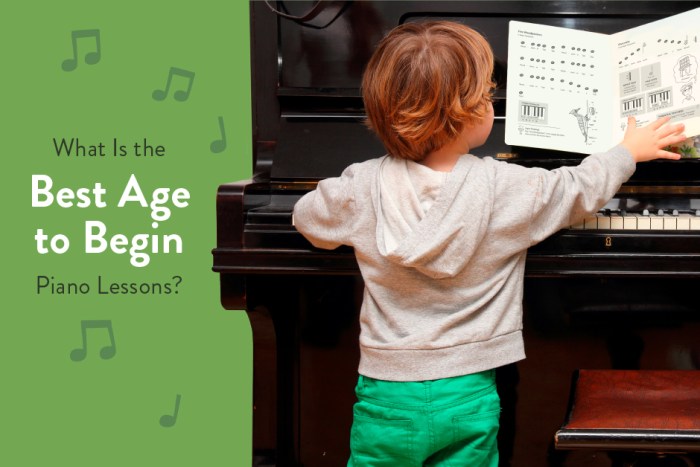
The ideal age to begin piano lessons depends on a child’s cognitive and physical development. Younger children may struggle with the fine motor skills, hand-eye coordination, and attention span required for piano playing.
Fine motor skills involve the small muscles in the hands and fingers, which are essential for playing the piano. Hand-eye coordination allows children to accurately strike the keys and read sheet music. Attention span is necessary for children to focus on the task and follow instructions.
Fine Motor Skills
- Piano playing requires precise finger movements and coordination.
- Young children may not have fully developed fine motor skills, making it challenging to play the piano effectively.
- Activities like finger painting, playing with blocks, and using scissors can help develop fine motor skills.
Hand-Eye Coordination
- Piano playing involves reading sheet music and coordinating hand movements accordingly.
- Hand-eye coordination allows children to accurately strike the keys and follow the notes on the page.
- Activities like catching a ball, playing video games, and drawing can improve hand-eye coordination.
Attention Span
- Piano lessons require children to focus and follow instructions for extended periods.
- Young children may have shorter attention spans, making it difficult to sustain focus during lessons.
- Activities like reading, playing board games, and participating in group activities can help improve attention span.
Musical Aptitude
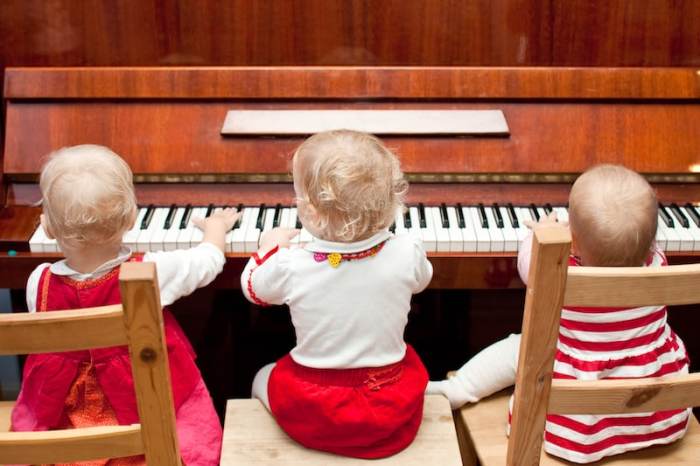
Musical aptitude plays a significant role in determining the ideal age for starting piano lessons. Individuals with a natural affinity for music may grasp concepts more quickly and progress faster. Key factors to consider include:
- Pitch recognition: The ability to distinguish between different musical pitches is crucial for accurate note-playing.
- Rhythm perception: Understanding and maintaining a steady beat is essential for rhythmic accuracy.
- Musical memory: The ability to recall melodies and chords aids in memorizing pieces.
Musical Aptitude and Age
Musical aptitude can manifest at different ages. Some children exhibit exceptional abilities from a young age, while others may develop them later. However, research suggests that children who begin piano lessons between the ages of 6 and 8 tend to show greater progress in musical aptitude.This
age range aligns with the optimal developmental stage for cognitive and motor skills. Children at this age are typically more receptive to learning new concepts, have better coordination, and can focus for longer periods.
Cognitive Benefits
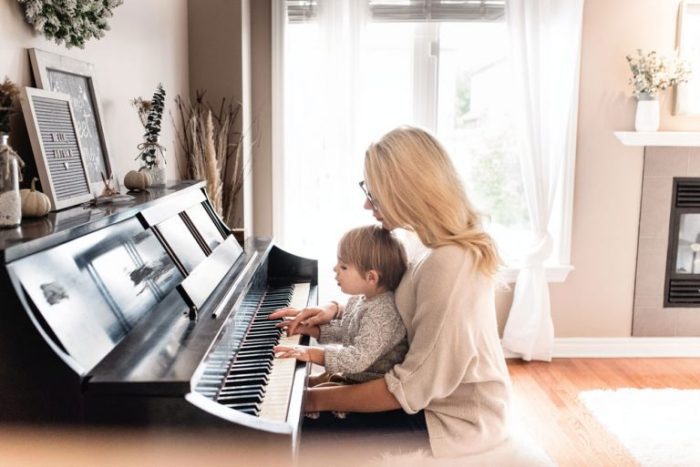
Piano lessons offer significant cognitive benefits for individuals of all ages. These lessons can enhance problem-solving skills, critical thinking abilities, and memory.At a young age, piano lessons can stimulate cognitive development. The act of learning to read music, recognize patterns, and coordinate finger movements requires children to engage in problem-solving and critical thinking.
Additionally, memorizing pieces and practicing scales helps improve memory skills.
Problem-Solving Skills
Piano lessons teach students to break down complex tasks into smaller, manageable steps. They learn to identify patterns and apply them to new situations, fostering problem-solving abilities.
Critical Thinking
Piano lessons encourage students to analyze music and make informed decisions about their playing. They learn to evaluate their own performances, identify areas for improvement, and develop a critical eye for detail.
Memory
Piano lessons require students to memorize musical pieces, scales, and fingerings. This process strengthens memory skills and improves overall cognitive function.
Social and Emotional Development
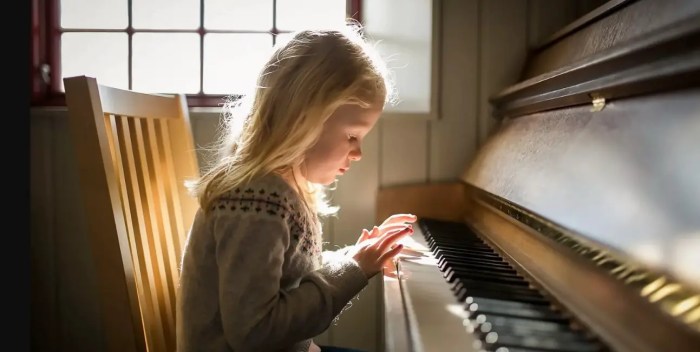
Piano lessons can contribute to social and emotional development by providing opportunities for:
- Self-expression: Piano lessons allow children to express themselves creatively and explore their emotions through music.
- Confidence building: Mastering piano skills and performing in front of others can boost children’s confidence and self-esteem.
- Social interaction: Group lessons and performances provide opportunities for children to interact with peers and develop social skills.
Group Lessons
Group piano lessons offer a unique social environment where children can:
- Learn from and collaborate with peers.
- Develop a sense of community and belonging.
- Gain exposure to diverse musical styles and perspectives.
Performances
Performing in front of an audience can be a nerve-wracking experience, but it also provides valuable opportunities for children to:
- Overcome stage fright and build resilience.
- Develop focus and concentration.
- Receive feedback and constructive criticism.
Interactions with Teachers and Peers
Piano teachers and peers play a significant role in children’s social and emotional development:
- Teachers: Provide guidance, encouragement, and support.
- Peers: Offer companionship, motivation, and a sense of camaraderie.
In conclusion, piano lessons can foster social and emotional development by providing opportunities for self-expression, confidence building, social interaction, and positive interactions with teachers and peers.
Intrinsic Motivation
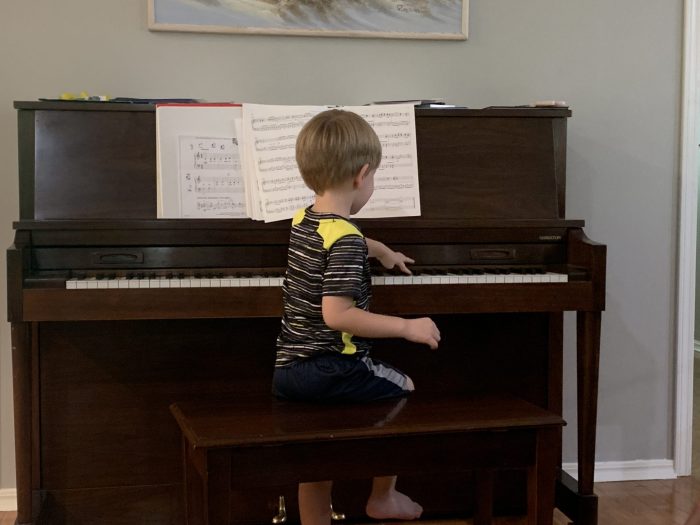
Intrinsic motivation refers to the internal drive that fuels an individual’s desire to engage in an activity for its own sake, rather than for external rewards or recognition. In piano learning, intrinsic motivation is crucial for sustained engagement and progress.
Fostering intrinsic motivation involves creating a positive and engaging learning environment that sparks a genuine interest and love for the instrument. Here are some strategies:
Make Lessons Fun and Engaging
- Incorporate games, activities, and songs that cater to the child’s interests.
- Use technology like apps and online resources to make learning interactive and accessible.
- Create a supportive and encouraging atmosphere where mistakes are seen as opportunities for growth.
Set Realistic Goals
- Avoid overwhelming the child with unrealistic expectations.
- Set achievable goals that foster a sense of accomplishment and build confidence.
- Celebrate progress and acknowledge effort, regardless of the outcome.
Provide Opportunities for Performance
- Encourage the child to perform for family, friends, or in small recitals.
- Performance experiences provide motivation, build self-esteem, and showcase progress.
- Focus on the joy of sharing music rather than perfection.
Teacher Availability and Expertise
Finding a qualified and experienced piano teacher is crucial for a successful musical journey. A skilled teacher can provide proper guidance, motivation, and support, fostering a positive and productive learning environment.
The availability of piano teachers can vary depending on the region, demand, and competition. In areas with a high concentration of music schools and teachers, students may have a wider selection of options. However, in less populated areas or during peak enrollment periods, finding a qualified teacher can be more challenging.
Teacher Qualifications
- Formal training in piano performance and pedagogy (e.g., bachelor’s or master’s degree in music)
- Experience teaching students of all ages and skill levels
- Understanding of child development and learning styles
- Strong communication and interpersonal skills
Teacher Availability
- Consider the teacher’s schedule and availability in relation to your preferred lesson times.
- Be aware of seasonal fluctuations in teacher availability (e.g., during school holidays or summer months).
- Explore online platforms or local music stores for teacher listings and availability information.
Age-Specific Approaches
Different age groups have varying needs and abilities when it comes to piano lessons. Tailoring the teaching approach to the specific age range can optimize learning outcomes.
Table of Age-Specific Approaches
The following table provides a general guideline for age-specific piano teaching approaches:
| Age Range | Lesson Duration | Focus of Lessons |
|---|---|---|
| Preschool (3-5 years) | 15-20 minutes | Exploration, rhythm, and simple melodies |
| Early Elementary (6-8 years) | 20-30 minutes | Basic note-reading, hand position, and simple pieces |
| Late Elementary (9-11 years) | 30-45 minutes | Intermediate note-reading, scales, and repertoire |
| Middle School (12-14 years) | 45-60 minutes | Advanced technique, music theory, and performance |
| High School (15-18 years) | 60+ minutes | Preparation for college auditions, solo performances, and advanced repertoire |
Individual Differences
Determining the best age for piano lessons is not a one-size-fits-all approach. Individual differences play a significant role in identifying the ideal time to start.Factors like learning style, personality, and home environment can influence the age at which a child is most receptive to piano lessons.
Children with a strong auditory memory and a natural inclination for music may thrive at a younger age, while others may benefit from waiting until they have developed more fine motor skills and attention span.
Learning Style
Some children learn best through hands-on experiences, while others prefer a more structured approach. The best age to start piano lessons for a child with a hands-on learning style may be earlier, as they can explore the instrument and discover its sounds and possibilities.
For children who prefer a more structured approach, waiting until they have developed a stronger understanding of music theory and notation may be more beneficial.
Personality
Children with a shy or introverted personality may benefit from starting piano lessons at a later age, when they are more comfortable performing in front of others. Extroverted children, on the other hand, may enjoy the social aspect of group piano lessons at a younger age.
Home Environment
The home environment can also influence the best age to start piano lessons. Children who have access to a piano at home and parents who are supportive of their musical endeavors may be more likely to succeed at piano lessons at a younger age.
A supportive home environment can provide encouragement and opportunities for practice, which can accelerate a child’s progress.
Research and Evidence
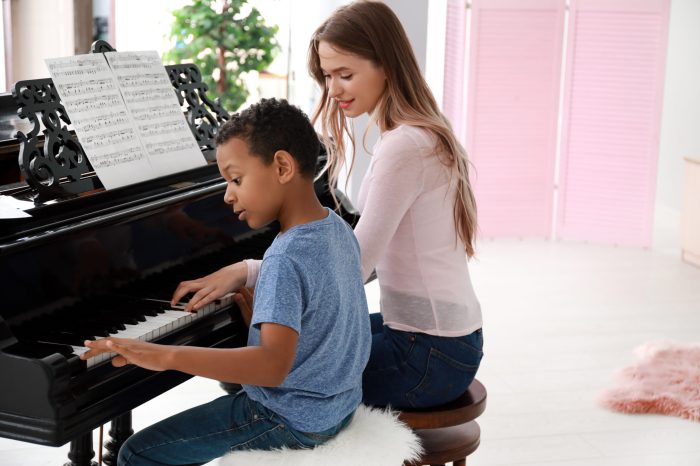
Research on the best age for piano lessons has yielded diverse findings, reflecting the complexity of factors involved. However, several studies provide valuable insights.
Studies and Implications
- Ericsson et al. (1993): This study found that elite pianists began formal training around age 7, suggesting that early exposure may enhance skill development.
- Hannon and Trainor (2007): This study demonstrated that musical training before age 7 improved pitch and rhythm discrimination abilities.
- Hallam (2008): A large-scale study found that students who started piano lessons between ages 6 and 8 had better overall musical achievement than those who started earlier or later.
These studies suggest that while early exposure to piano lessons may provide some advantages, the ideal age may vary depending on individual factors and the specific goals of the student.
Professional Perspectives
Piano teachers and musicians possess invaluable insights into the optimal age for initiating piano lessons. Their experiences and observations provide valuable guidance for aspiring pianists and their parents.
Renowned Pianists
Acclaimed pianists often share their perspectives on the ideal age for commencing piano lessons. Many emphasize the benefits of starting early, as it allows students to develop a strong foundation and technical proficiency.
“The earlier you start, the more time you have to develop your skills and artistry.”
Lang Lang
Piano Pedagogy Experts
Piano pedagogy experts conduct research and develop teaching methods that optimize learning outcomes. They recommend starting piano lessons between the ages of 5 and 7, when children possess the necessary cognitive and physical abilities to grasp musical concepts and develop dexterity.
Music Education Organizations
Organizations such as the National Association for Music Education (NAfME) and the Music Teachers National Association (MTNA) advocate for early music education. They recognize the positive impact of music lessons on children’s overall development and encourage parents to consider starting lessons at an early age.
Closing Summary
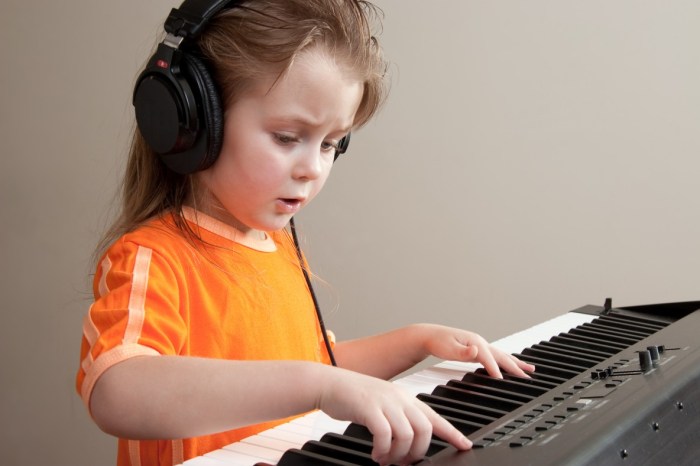
In conclusion, the best age to start piano lessons is a multifaceted decision that should be tailored to the individual child. By considering developmental factors, musical aptitude, cognitive benefits, social and emotional development, intrinsic motivation, teacher availability and expertise, age-specific approaches, individual differences, research, and professional perspectives, parents and educators can make an informed choice that sets the child on a path to lifelong musical enjoyment and accomplishment.
FAQ Section
Is it better to start piano lessons at a young age?
While early exposure to music can be beneficial, the optimal age for formal piano lessons varies depending on the child’s developmental readiness and individual characteristics.
What are the benefits of piano lessons for young children?
Piano lessons can enhance fine motor skills, hand-eye coordination, problem-solving abilities, critical thinking, memory, and social and emotional development.
Is it too late to start piano lessons as an adult?
Absolutely not! Adults can enjoy the benefits of piano lessons at any age, regardless of their prior musical experience. With dedication and consistent practice, adults can make significant progress and derive immense satisfaction from learning the piano.